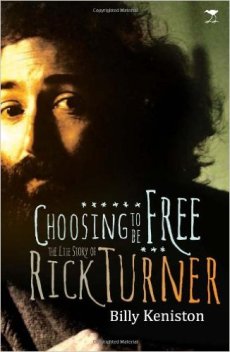
Over the holiday we had a quick chat with author, historian, and OYO project advisor, Billy Keniston. Keniston’s work over the years has focused primarily on understanding and confronting the destructive dynamics of american racialism. His two books, “A Problem of Memory: Stories to end the racial nightmare,” and “Choosing to be free: A life story of Rick Turner,” both reflect his strong desire for a society rooted in meeting human needs.
OYO: Much of your work seems to deal with American radicalism in way or another. How did you get interested in both the history and practice of radicalism?
BK: I was, in a way, “raised” to be interested in radical politics and the history of radicalism in this country. That is, as my uncle was a member of the Young Patriots, I was exposed from an early age (14 onwards) to his ideas and to his stories of attempting to bring about revolutionary change in the united states. In particular, my uncle encouraged me to focus on the history of the black freedom struggle in america, and consistently encouraged me to find a way, as a white person, to engage with that struggle in a sympathetic way. I have come to see whiteness as one of the biggest barriers to radical social change in this country, and I see myself as engaged in a lifelong process of attempting to undermine the powerful legacy of white skin privilege, which has tended to govern every aspect of our society, for generations.
OYO: You’ve recently been making some comparisons between the work of white activists in the Uptown neighborhood of Chicago and white activists in South Africa. Can you share some of what you’ve found?

BK: In 2008, I moved to South Africa in order to earn a Masters degree in history. My work focused on the struggle against apartheid, and in particular the participation of white radicals in that struggle. I found in South Africa a number of important parallels to our own history, here in the united states. At a certain moment in the struggle in South Africa, black radicals began to question the substance of racial “integration,” and broke away from mixed race groupings in order to form their own organizations. This was similar to what was called “Black Power” in this country, but in South Africa, the focus was on Black Consciousness. While both groups sought to uplift black people’s self-confidence and capacity to govern their own lives, the focus on consciousness was significant, as it meant that black South Africans saw themselves as needing to *think differently,* to develop an alternative worldview, not just to seize power. In response to this movement, many white activists were troubled and stuck, or felt personally offended. But a number of white radicals made attempts to take the demands of black consciousness seriously. Most notably, Rick Turner was a white radical thinker that encouraged other white people to understand black consciousness as a form of radicalism, and to engage in their own process of adopting a profoundly different worldview. The emphasis in South Africa was on encouraging white people to renounce their privilege, and to embrace living in a majority black society in which black people have dignity and control of their own destinies. White radicals in america focused a bit more on confronting poverty, and on the idea of developing initiatives in white communities where poor and working class whites could build structures based on their own grievances, and then to make alliances with black people, from there. In a sense, this work was explicitly against confronting people’s values or ideas directly. The idea was to organize, first of all, and then the hope was that the practical work of interracial coalition would shift people’s values.
In hindsight, the initiatives of white radicals in both countries were both short-lived and under-valued. There was a clear limit to what could be accomplished, in attempting to undermine racialism inside of a deeply racist and repressive society. Still, I find these efforts to be profoundly inspiring, regardless of the difficulties involved and regardless of their shortcomings.

